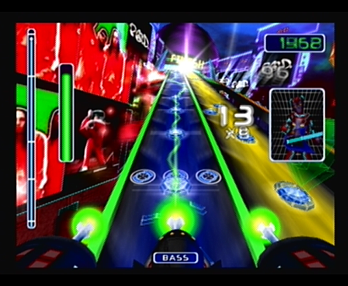
Here comes the Boom! |
|
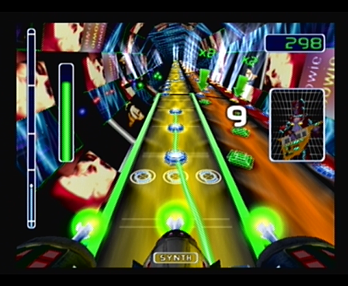
David Bowie Says "Hi". |
If the thought ever occurred to you that playing with a video game controller, especially with the rhythm and timing necessary for beating stages and bosses in tough action games, was anything like playing an instrument, then you can take comfort in knowing that Harmonix, the developers of Amplitude - the forefather of the Guitar Hero and Rock Band series of games, must've felt the same way. Although not an entirely original concept as it's a sequel to an earlier (and similar) game called FreQuency, Amplitude's purpose of reappropriating the Playstation 2 controller as a musical instrument is a daring and almost magical synergy of video game challenge and contemporary music.
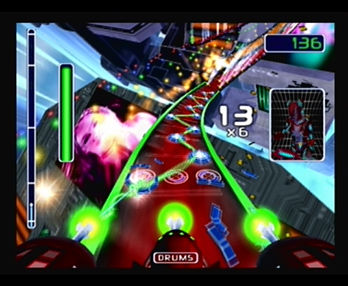
Thanks to Amplitude, I now have more respect for Pink than I previously did. |
|
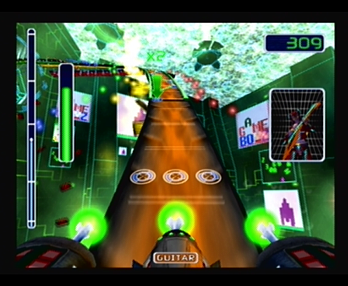
Yes, those are Game Boy references in a Sony game. I hope no one got fired over that. |
Amplitude resembles a 3rd-person rail shooter (a la Star Fox), as you control a ship (called the "Beat Blaster"), that travels along, and can switch between, a set number of parallel tracks that wind through each stage like a psychedelic rollercoaster. Each track is color-coded and represents a separate instrument in the song (red=drums, orange=guitar, green=vocals, blue=bass, etc.) The Beat Blaster has three cannons - Left, Middle, and Right - which are assigned to different buttons on the contrtoller and used for shooting at targets that appear along the tracks.
The targets correspond to the notes/beats in the music and success depends not only on firing the correct cannon, but also in timing the shots properly with the beats so that the cannon's laser fire connects and "plays" the note. Hitting a series of targets in a row (called a "phrase") will cause the track to crumble away and play on its own for awhile, which earns you a certain amount of points. Missing notes will cause the Beat Blaster to lose energy and put you closer to a Game Over.
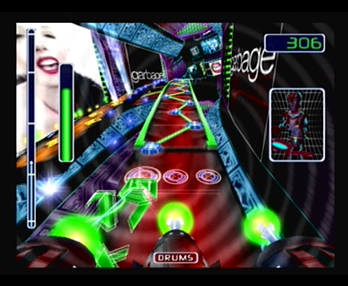
Shirley Manson shows off her "cherry lips". |
|
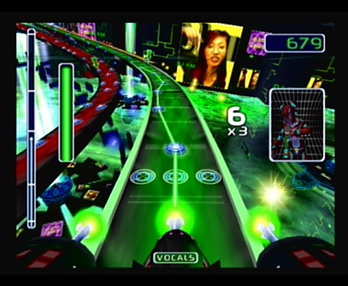
The graphics on this track are so cool (baby). |
The short term goal is to activate as many tracks as possible, which will keep the Beat Blaster going, and also feed into the long term goal of achieving high scores and unlocking bonuses. The longer you can go without missing a note, the higher the score multiplier will rise (until a maximum of 8x). So, if a track is normally worth 10 points, and you clear it with a 7x multiplier built up, you'll earn 70 points for it.
One problem I've always had with playing games for score is that quite often it's impossible to tell when you have scored high enough and should consider the game "mastered", but Amplitude solves this issue by ranking your scores on a scale of 1-3 for the easiest difficulty setting and 1-4 on the harder settings. Memorization, fast fingers, and trying to keep time with beats go a long way, but they aren't always enough. Sometimes, you can play a song perfectly and still end up a few points short of the goal for that elusive four-bar score. Coming up with the extra 80 or so points required is like being Gary Sinise in Apollo 13 trying to figure out where the extra power for the Command Module was going to come from.
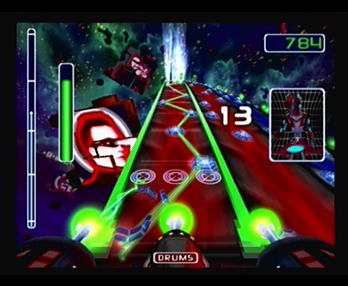
A game so awesome, you'll want to play it as soon as you get it out the box. |
|
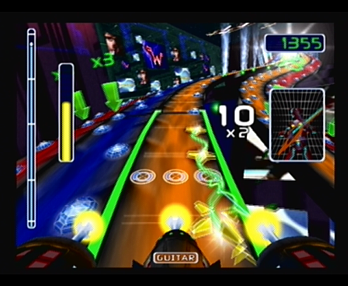
Who knows how to play a Weezer song with a Playstation controller? This dope knows! |
This is where power-ups come in. As you progress through the early stages, different power-ups are unlocked. The more useful of these include a Score Doubler that does exactly what you'd think, an Auto Blaster that can be used to clear a track instantly, and a Free Styler that clears all tracks for awhile so that the Beat Blaster can go airborne and do loop-de-loops for points. The latter two can be useful for keeping the score chain going if you miss a note, and can often make the difference between a three and four-bar score, or on the harder settings, even just beating the song. But since what powerups appear and where they appear on the tracks is randomly designated when you begin a stage, some measure of luck is involved in utilizing them to achieve your goals.
While the notes are so sparse on "Mellow" (the easiest difficulty setting) that it barely seems like playing along with the songs at all, the amount of notes you have to hit is cranked up a notch on "Normal", gets especially intense on "Brutal", and is so ridiculous on "Insane" (the hardest setting) that I have, for the time being, kissed any dreams of getting four-bar scores on most of those songs without buying a special controller goodbye. (PS: I'm actually stuck on Slipknot as of writing this review.)
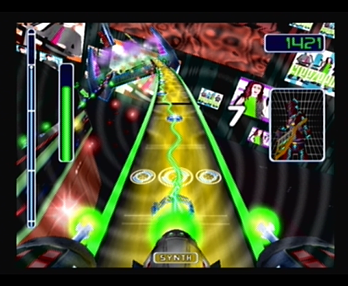
This track is Super-Sprode. I don't know what that means, but that is what it is. |
|
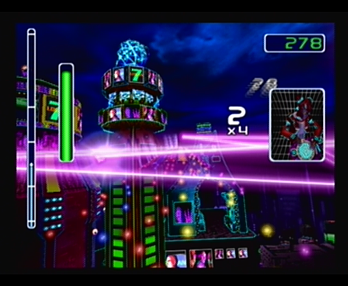
Freestyling - uptown on a Saturday night! |
Amplitude can be equally intense if playing for high scores or playing to win. I never got a Game Over on Mellow and breezed through most of Normal until I hit the final "boss", Synthesized, which was the proverbial brick wall. The amount of notes on the drum tracks and the speed at which the stage moves was so mind-boggling, I literally couldn't comprehend what I was seeing at first, and only barely squeaked by it when I finally won. To exemplify how one can vastly improve through continuous play, I can now get a four-bar score on that stage like it's nothing. Similarly, Brutal difficulty is now easy for me to get through in terms of just beating the stages. But in terms of getting high scores, that's a different story.
Remember that you are not only being asked to practically learn to play an instrument, but you have to learn every instrument for over two dozen songs in various styles from rock, techno, and pop, to rap, metal, and trance. To some extent, you can try to rely on visually matching up the Beat Blaster's sights to the targets, but you will probably find that if you know what the bassline sounds like and can tap in time with it, that will get you farther. But once that bass track crumbles, you must be prepared for the guitar track or the drums or vocals. The more you know, the farther you go.

We've got fools on the case, but we still know when to autoblast! |
|

Don't blink! |
All of this would make for a fine and unique video game experience, but where Amplitude goes the extra distance is in its musical presentation. Amplitude has much higher production values than its predecessor, FreQuency. While FreQuency's soundtrack consisted mostly of songs by artists that you had (probably) never heard of before, Amplitude's roster includes such heavyweights as David Bowie, Garbage, Papa Roach, Slipknot, Weezer, Pink, Run-DMC, and Blink-182, amongst others. So, even if the songs aren't familiar, at least the names are.
One of the (possibly unintended) side effects of playing Amplitude was not only being introduced to some great songs I wouldn't have heard otherwise (especially David Bowie's "Everyone Says Hi"), but also gaining a new perspective on some artists and even some entire genres. I now have a greater appreciation of rap/hip-hop than I did previously. Though I've always been impressed by how rap artists can rhyme lyrics, when you actually get to play along with Run-DMC, Quarashi, or Wildchild, the music's creativity takes hold. It certainly says a lot about not only Amplitude itself, but video games in general that they had the potential and power to do that.
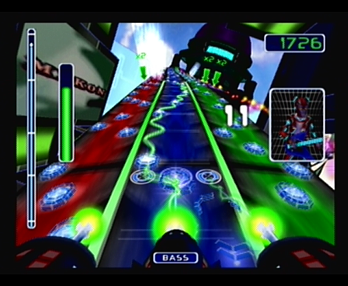
No stupid puns this time - just an eerie shot of the looming boss tower in the distance. |
|

I want to be synthesized, too. |
Even the songs that were made by Harmonix's "house bands/artists" (many of which are one guy using several different aliases) are extraordinarly high-quality. It can be fun trying to figure out what songs were composed specifically for the game and which weren't. Though many of the Amplitude exclusives tend to skew towards techno, there are some standouts, such as Plural's catchy dance-pop number, "Cool Baby', and "Push" by Game Boyz - an impressive grunge-style headbanger in the vein of Nine Inch Nails that is played against a backdrop of oldschool video game graphics. Considering the name of the "band" and the unmistakable resemblance of the graphics to a certain competitor's handheld console with the same name, I'm surprised it got on here - even funnier when you consider Sony themselves published Amplitude.
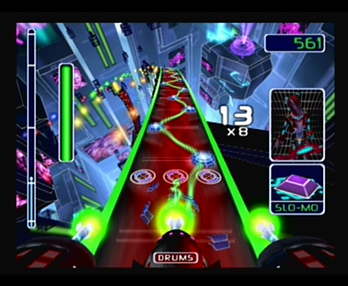
That's quite a drop-off! |
|
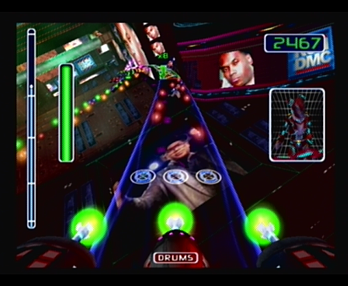
It's Run-DMCEEEEEE! |
If there's any caveat I have for Amplitude's it's that its innovations may prove a liability. Harmonix had originally proposed the idea of FreQuency to Microsoft, who rejected it on the grounds that they believed a rhythm-based game would need a specialized controller. It's difficult to blame the big M$ for that decision because it's obvious the Playstation controller was never meant to be used in this manner.
While it's feasible to beat the Mellow setting with the default control scheme, the higher up the ladder you climb, the more you might find yourself switching to increasingly unorthodox setups. I changed my controls no less than three times and still feel as though getting higher scores on the harder difficulties would be almost impossible. The left trigger button, especially, doesn't seem to want to fire consistently fast enough to hit long segments of notes in a row (see: Blink-182's "The Rock Show" track). Something like a fighting game arcade stick might be useful, but those are hard to come by for the Playstation 2.
I might also be concerned about the level of abuse Amplitude lays onto the controller. While I haven't had problems yet, every time I play the game a small part of me hopes it stays that way.
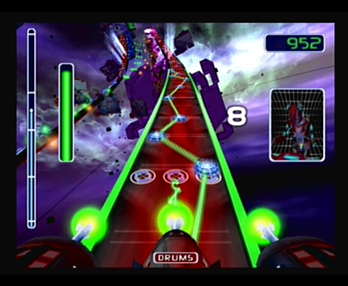
I'm on a highway to hell (no that song's not actually in this game - it just looks that way). |
|
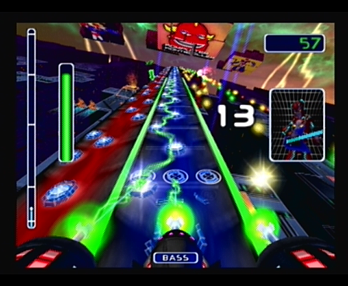
Creepy devil robot head wants to steal your soul... |
So long as your controllers don't wear out, Amplitude is endlessly entertaining. While it provides a lengthy challenge if you're trying to complete an entire difficulty level, it's also a game that you can pick up anytime for a "quick play" if you just want to run a track or two to improve your score. That you get to hear some really great music while doing it is certainly a reason to go back time and again. Perhaps best of all is that Amplitude is proof that video games can harmonize with other contemporary forms of art and don't always have to be relegated to their own cultural bubble. While the media debate over whether or not video games can be considered "art" will rage on for decades, one thing is for certain - they are getting harder and harder to ignore. That Amplitude's successors, Guitar Hero and Rock Band, would become such cultural phenonemons is a testament to this. From the video game end to the rest of the world: Everyone says hi!
OVERALL
SCORE: 4/5
THIS REVIEW WAS SPONSORED BY MASQUED WARRIOR VIA THE 5 DOLLAR FO CHALLENGE PROGRAM!
BACK
TO PLAYSTATION 2 REVIEWS
BACK
TO MAIN PAGE
|



